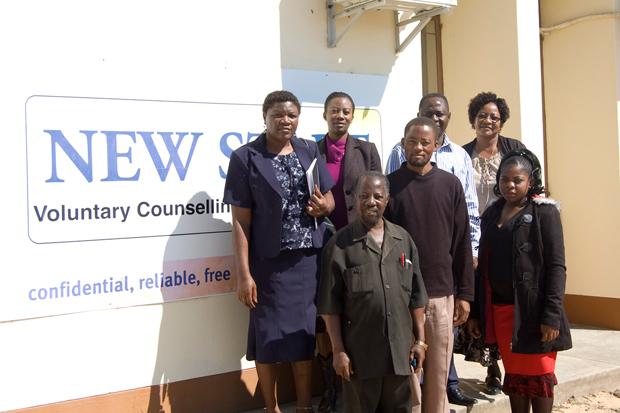Where We Work
See our interactive map


Say you’re feeling sick, and you’ve gone to your local clinic to see someone about it. You tell the health worker that you’ve been feeling awful and haven’t been getting any better and you’re worried, because you know that a lot of people in your country have HIV (13.4% of adults, to be exact, because you live in Namibia).So the clinic runs an HIV test. And it comes back positive.
This is the situation in which a lot of clients who visit the Rundu New Start Center find themselves. Many are shocked and scared when they hear the results. When the HIV counselor starts talking about next steps—what the client needs to do right now to start managing the disease and getting the right kinds of care—it’s understandable that some clients may only half-absorb the information.
Then the health worker writes the client a referral for an appointment at the local hospital, where they’ll get more care. At this point, some clients square their shoulders and head straight there. Others are too sick to go right away. And some—far too many—can do nothing but sit in their homes, paralyzed by fear and panic and shame, not knowing what to do or what their diagnosis means for them and their families
.When I talked about this with HIV counselors Magdalena, Josef, and the rest of the staff at the Rundu New Start Center in Namibia’s northern Kavango region, it was clear that they care deeply about their clients and want them to get the care they need. They know there are a lot of everyday obstacles that can keep people from getting to medical appointments. But they also know that the health and well-being of their clients with HIV depends on those referrals. The New Start Center is small, and it can’t provide all the services clients need. Referrals to clinics and hospitals are a way to guide them through the complex process of HIV care.
Magdalena and her colleagues have been using a new referral system designed by IntraHealth International to follow up with clients who don’t make it to their appointments. The new system lets staff know who didn’t make it to their referral appointments, which then allows the clinic to follow up with those who may be too sick or scared or confused to seek care—and to offer them help.
So far the system has been tested in 55 health facilities. IntraHealth staff in Namibia are now working to enhance the system’s design and to scale it up. When that happens, other facilities around the country may find the same thing Magdalena and her colleagues at the New Start Center found—that not only does the system help clients get the care they need, but it also helps to build a deeper sense of trust and caring between clients and health workers.
Rundu clients are lucky to have the fantastic staff at the New Start Center. And Namibia is lucky to have health workers like them.
This work was performed under the IntraHealth project Namibia Capacity Building for Country Owned HIV/AIDS Services, which is funded by the US Agency for International Development.
Read more:
Get the latest updates from the blog and eNews




